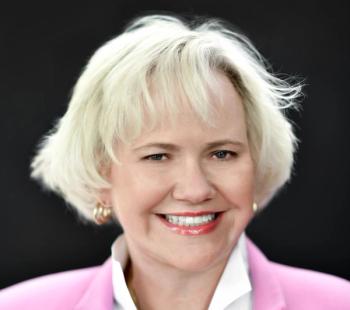
Takeaways from HLTH 2023: AI ‘hope and hype’, using the right data, and attention on women’s health

Several healthcare executives shared their perspectives from the annual conference in Las Vegas.
Just a week ago, thousands of people visited Las Vegas, and they weren’t in Sin City for the casinos or concerts.
Thousands gathered for the HLTH 2023 conference. The sixth annual HLTH event brought together providers, tech companies, payers, and a host of thought healthcare thought leaders.
Several healthcare leaders shared their main takeaways from the healthcare conference. As one may have predicted, artificial intelligence emerged as a hot topic.
But leaders also said they were important discussions on the better use of data, improving the patient experience, health equity, and women’s health.
Here are the perspectives from a host of leaders who attended HLTH.
Colin Banas, chief medical officer for DrFirst, a tech company offering solutions to improve medication management.
“You could feel it – the hope and hype around AI reached fever pitch at HLTH. So much so that it was hard to discern real world applications from vaporware. In this sea of CIOs, CTOs, and other leaders asking questions and searching for AI’s actual proof points, it took a lot of wading through promises about new paradigm-changing tech to find real-world examples of where AI already has a clinical track record of safety and efficiency. It was there, and savvy leaders found it.”
Lyle Berkowitz, CEO of KeyCare, a company offering health systems access to a network of virtual care providers.
“HLTH was crowded with digital health companies all trying to make things faster, better, cheaper or easier via some combination of artificial intelligence, automation or virtual care. And while past focus seemed to be more on a direct-to-consumer approach, we are seeing a continued shift of companies proposing how they can help health systems deal with the masses of patients knocking at their front door. However, with health systems slowing down on travel this year, it appeared there were more discussions on partnerships than selling.”
Amanda Bury, chief commercial officer at Infermedica, a digital health company specializing in AI-powered solutions for patient triage.
“While conversations ranged from achieving health equity to the importance of patient advocacy, a key takeaway was the trajectory of AI and its impact in healthcare. It’s universally accepted that AI has the potential to revolutionize healthcare by improving patient engagement, helping with physician burnout, and cutting down on administrative tasks, but there are still some significant challenges to overcome – the need for better validation methods, the risk of bias in AI model outputs, and issues with consistency to name a few. Success hinges on finding the delicate balance of fostering innovation while also building and maintaining trust as the cornerstone of any AI advancements.”
Cheryl Cheng, founder and CEO, Vive Collective, an investment platform to build digital health and healthtech companies.
“This was our second year attending HLTH. This year, we saw a lot more maternal health, pediatrics as well as dental companies. Maternal and pediatric health is a focus topic for many of the plans we spoke with. Not surprisingly, interoperability was still being talked about. Although there is a growing sense that real interoperability will soon occur, there are still challenges that healthcare organizations haven't fully addressed. When underwriting new opportunities, the investing community is still cautious and focused on unit economics and important business fundamentals.”
Maulik Majmudar, cofounder and chief medical officer of Biofourmis, a technology-enabled care delivery company.
“All the discussion at HLTH can essentially be distilled to how we can best capture, identify and act on the right data to improve outcomes and experience across the patient journey. The growing adoption of care-at-home, for example, means even more data is being shared than in previous years with providers and clinical trial investigators through consumer devices and wearables, both continuously and episodically. Health tech’s role must be as a partner to healthcare providers and life sciences companies advancing their digital transformations, by helping make sense of this vast amount of endlessly accumulating data in a way that does not limit, but enhances their abilities to deliver personalized patient care and research where, when, and how patients need it.”
Justin Norden, partner at GSR Ventures, a venture firm investing in early-stage digital health companies.
“Generative AI was still the hot topic at HLTH 2023. The conversation is maturing from what started out as listing buzzwords to becoming more sophisticated about how we are going to implement these technologies, prove that they are safe and effective, and what regulation might come in the future. Overall, we are still at the very earliest stages of adopting generative AI in healthcare but it was clear to many that these tools are here to stay.”
Kim Perry, chief growth officer, emtelligent, which provides clinical AI solutions.
“There was a lot of buzz at HLTH around accelerating the use of clinical data. Now that companies are collecting and attempting to leverage clinical data, they realize there is work to do to make the data usable. The data processing pipeline is becoming the focus of healthcare organizations that recognize how cleansing, normalizing, and structuring data are imperative. Almost all conversations at HLTH regarding use of clinical data included questions about structuring notes – key to uncovering actionable data at scale.”
Josh Rubel, chief commercial officer, MDClone, a data analytics and synthetic data company.
“The HLTH conference was filled with engaging healthcare leaders focused on improvement in health and healthcare delivery. Data, protecting data, and using data to find insights to accelerate that improvement was ever-present. It's clear that better, wider, and better-protected data to drive innovation is top-of-mind for policymakers, entrepreneurs, provider organizations, and life science firms. The right kind of technology to empower users while protecting patient privacy is a ‘must have’ for 2024 and beyond.”






















































































